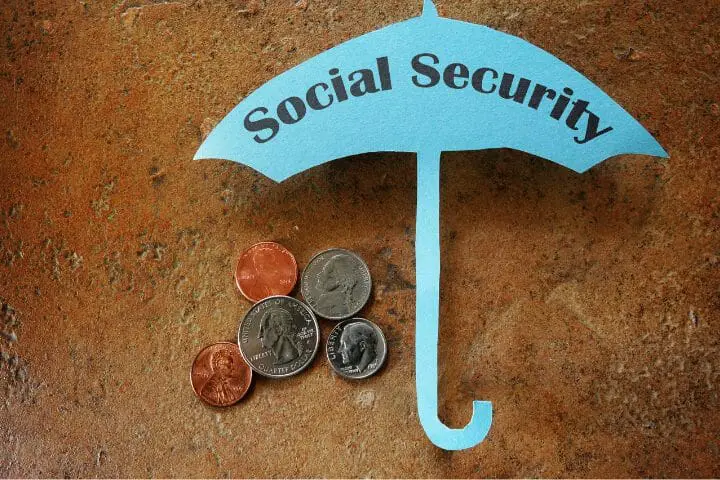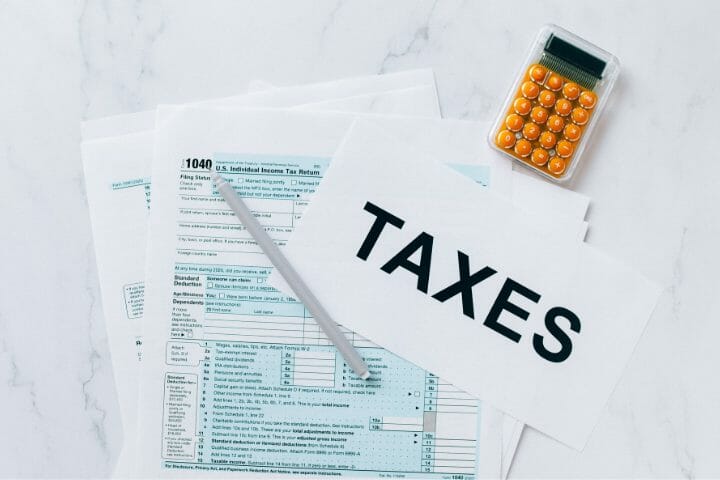Once you retire, you might think the government would give you a reprieve from taxes. So, at what age is social security no longer taxed? The answer: never. Apparently, death and taxes are the only constant in the world! Read on to know how much of your SSA may get taxed.
Contents
Social security benefits are received by millions of people in the United States. But unfortunately, some older adults have to pay taxes from their social security benefits.
So at what age is social security no longer taxed? There is no particular age at which you will no longer be exempted from taxes of social security benefits.
However, it depends on the combined income level of you and your spouse. If the combined income level is greater than the income limit set by the IRS, you have to pay taxes from the benefits received by Social Security Administration.

In this article, we will discuss taxation of social security benefits. We will cover:
- Does age influence taxation?
- How is social security taxed (minimum income levels)
- How you can avoid paying these taxes
- States that tax social security
- When and how to report social security income
When Does Social Security No Longer Get Taxed?
There is no particular age at which Social Security will not be taxed.
A senior person will get complete social security benefits, after attaining full retirement age. Depending on when you were born, you will reach your full retirement age between the age of 65 to 67.
For instance, if a senior is born in 1956, he will receive his full social security benefits at age 66 and four months. Similarly, if a person was born in 1959, then he will receive 100 percent of social security benefits at 66 years and ten months.
But if the senior person wishes to continue working after retirement. and his combined income level becomes more than the specific income limit set by IRS, then he needs to pay taxes even on the income that they have got from the social security benefit.
You might also like to read: Do Immigrants Receive Social Security At Age 65?
Does Social Security Count as Income?
Social Security is not counted as gross income. However, IRS includes it as a combined income to determine whether you need to give taxes from the Social Security benefits.
The IRS calculates how much amount to be taxable as follows.

- Your adjustable gross income is first calculated. It includes social security and various other sources.
- The nontaxable interest and half of your social security benefits that you receive annually are added to the adjusted gross income.
So, your combined income is equal to adjustable gross income plus nontaxable interest and half of the social security benefits.
Do Seniors Pay taxes on Social Security Income?
Yes, seniors have to pay taxes on social security income, but only when their combined income exceeds the minimum limit set by the IRS.
The United States social security Administration has provided benefits to retirees, disabled people, and their family members since 1935. But after 1983, recipients have to pay income tax on their social security benefits if their combined income is greater than the limit set by IRS.
If social security is the only income source of a senior person, then their gross income is zero. So they don’t have to pay any taxes on his social security benefits.
For instance, you don’t have to pay any income tax from your social security benefits if your combined income level is less than $25,000.
But if your combined income level is falling between $25,000 to $34,000, then you are compelled to pay tax on upto half of your social security benefits.

Do I Have To Pay Taxes On My Social Security?
It depends on your combined income, as we explained above.
If the senior person earns a certain income after retirement and they are also getting social security benefits, they need to pay taxes. For instance, an unmarried older adult has a combined income level between $32,000 to $44,000; then, they must pay taxes on upto 50 percent of the social security benefits.
Here, it is pertinent to note that Social Security Administration allows the workers to receive benefits after age 62. However, the worker may choose to put off his benefits till age 70. So if you feel that you might be taxed, there is an option for you to defer your benefits.
You might also like to read: Will Social Security Pay for Assisted Living
How Are SSA Payments Taxed?
The social security benefits have been subjected to taxation above a specific income limit set by IRS since 1983. However, if your income source is social security benefits after retirement, you will be exempted from the tax.

Married Tax Rates
If you and your spouse file a joint return and report that your combined income is between $32,000 to $44,000, then 50 percent of your social security benefits will be taxable.
But if your combined income is above $44,000, then you have to pay taxes on upto 85 percent of your social security benefits.
For instance, if a semiretired couple gets combined social security benefits as $26,000 and has $30,000 as other income, then the gross income is $56,000.
However, the IRS will calculate $43,000 as a combined income ($30,000 + 50% of $26,000). This combined income is within the range of $32,000 to $44,000, and your taxable income then becomes 50% of ($43,000 – $32,000 ) = 50% of $11,000 = $5,500

Individual Tax Rates
Suppose you are single and your income is between $25,000 to $34,000. In that case, 50 percent of your social security benefits will be taxable. Moreover, if it is above $34,000, then 85 percent of the benefits will be taxable.
If an individual gets annual social security benefits of $16,000 and has other income sources as $20,000. Now your gross income is $36,000 ($16,000 plus $20,000 which is equal to $36,000).
However, like in the married persons example, the IRS calculates the combined income as $28,000 (Other income sources + half of the social security benefits ($20,000 + 50% of $16,000 = $28,000).
Now $28,000 lies within the income limit of $25,000 to $34,000. Your combined income minus the threshold value will give you $3000 ($28,000- $25,000). The IRS calculates taxable incomes at 50 percent of $3000 which is $1500.
You might also like to read: Latest Social Security Calculator
How Can I Avoid Paying Taxes On Social Security?
Seniors have a limited source of income after retirement. Some people immensely depend on social security benefits. Others do some side business to meet their financial requirements.
But if the combined income exceeds a specific income limit, you need to give taxes from your social security benefits which may hamper your financial status.
Fortunately, there are a few ways to avoid paying taxes on social security. I am discussing them below.

#1. Move To A State Which Is Exempt From Social Security Taxes
The best thing is you need to relocate to a Social Security friend State where you can save your money from taxes during your golden years. So research carefully before moving to a new state because the State may exempt taxes from social security benefits but can have high sales tax and other taxes, which may cost you more than your current State.
#2. Contribute Money To Roth IRA
The IRS calculates the combined income to find out how much percentage you will pay as Social Security benefits. The combined income is the sum of adjustable gross income and half of the social security benefits.
If you are withdrawing $40,000 from 401K and getting $20,000 as social security benefits, then your combined income will be $50,000 in a year ($40,000 + 50% of $20,000).
Since this is higher than the threshold, 85 percent of your Social Security benefits are taxable, which is quite high in your old age. The only way to be exempt of these taxes is to make the combined income fall below $25,000.
The best way is to keep it in Roth IRA. So now, if you will withdraw $40,000 in Roth IRA and get $20,000 as Social Security benefits, then your combined income will be only $10,000, which is less than $25,000, So you will be exempted from Social Security benefit taxes.

#3. Defer Your SSA Benefits
You can choose to defer your SSA benefits till the age of 70 years, if you are planning to work after retirement. This will remove the SSA income from your taxable income, potentially reducing your tax burden.
If you now stop working at 70, you would have saved tax for the previous 10 years, and then save tax later as well once you are actually retired.
Which States Tax Social Security?
There are only thirteen States in the United States where you have to give taxes from your Social security benefits. I am listing those States below.
- Colorado
- Connecticut
- Kansas
- Montana
- Missouri
- North Dakota
- New Mexico
- Rhode
- Utah
- Vermont
- West Virginia
- Nebraska
- Minnesota
You might also like to read: Top 9 States That Don’t Tax Retirement Income
When do You need To Pay Taxes On Social Security?
Every year in January, you will receive a Social security benefit statement showing the amount of benefits you have received in the previous year. You can use that statement to fill a federal income tax return and determine whether your benefits are subjected to tax or not.

How To Report Your Social Security Income?
You can report your Social Security income by calling the toll-free number 1-800-772-1213. The representative is available from Monday to Friday from 10.00 am to 5.00 pm. you can even visit the local Security office and enquire about the Social Security income.
Frequently Asked Questions
#1. Is Social Security taxed after age 70?
Yes, Social Security can be taxed for people above 70 years old. However, if the Social Security benefits are your only source of income, then you will not be taxed.
Suppose the older adult above 70 years old chooses to work in any organization, and his combined income exceeds the income limit set by IRS. In that case, he is bound to give taxes from the benefits received by Social Security Administration.
#2. How can I avoid paying taxes on Social Security?
You can avoid paying taxes on Social Security mainly in two ways
Move to a Social Security friendly State in the United States
Withdraw money from Roth IRA.
#3. Who is exempt from Social Se
Nonresident aliens
Foreign Government employees
A Few Final Words
Paying taxes from the Social Security benefits in golden years is seriously an unwelcoming chore. However, there are few ways to reduce taxes on Social security. For instance, you can reduce your business income or start withdrawing money from Roth IRA. You can even move to a new State which does not impose taxes on Social security benefits.
Thank you for reading the article, we hope we covered everything that you wanted to learn about taxation on your social security income and how you can reduce the amount. If you have further queries, do write to us and we will get back to you.
